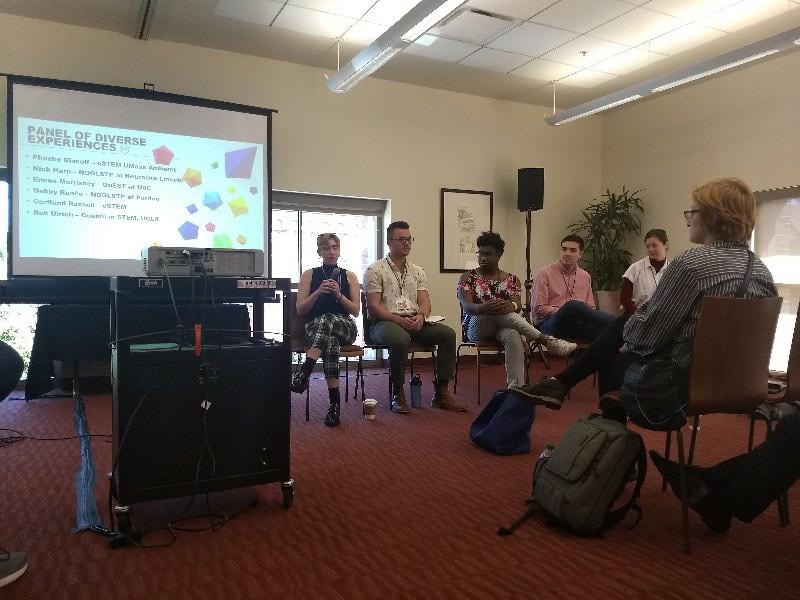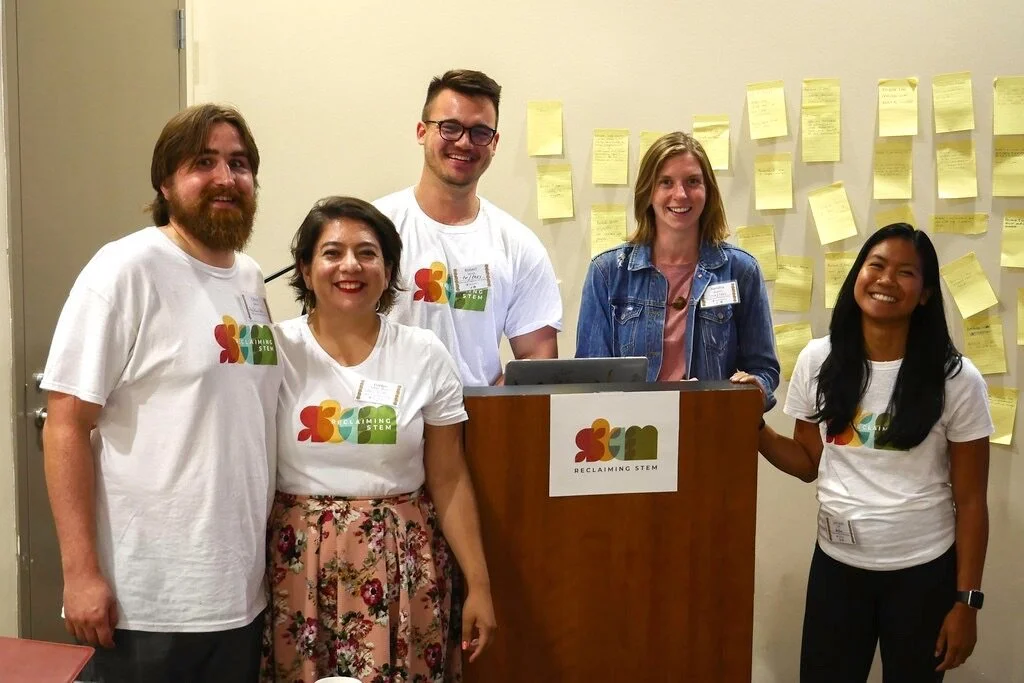I advocate for justice, equity, and inclusion to be at the center of how people do science.
Throughout my experiences, I have cultivated skills, lessons, and experiences, and applied them to my advocacy. The isolation I felt growing up in a rural, catholic setting being biracial and queer was further augmented when I attended undergraduate in southwest Virginia. I saw my move to UCLA as a chance to start fresh and was determined to create spaces where I and other LGBTQ+ people in STEM could find community with each other. The results of this have manifested in what I consider my biggest contributions (among others) to the STEM and LGBTQ+ communities: Co-Founding Queer & Trans in STEM, Co-Organizing International LGBTQ+ in STEM Day, and Co-Directing Reclaiming STEM.
In 2018, I co-founded and led Queer & Trans in STEM (QTSTEM, formerly Queers in STEM) at UCLA. Growing to a membership of over 330, QTSTEM has become a space for diversity & inclusion advocacy centering the LGBTQ+ community. We’ve organized events ranging from meet-n-greets and nature hikes to research symposia and free-form discussions about the lived experiences of LGBTQ+ people navigating STEM environments. We’ve also collaborated with the LA LGBT Center by giving talks about paths to STEM careers to the houseless youth currently living there. In 2019, my leadership of QTSTEM led me to be nominated for and awarded the Curtis Shepard UCLA LGBT Leadership Award and for QTSTEM to be named UCLA Student Organization of the Year.
Further, we have helped build communities that extend beyond UCLA’s campus, and we collaborate with organizations at other universities and even in other countries. With global collaborators such as Pride in STEM, House of STEM, Out in STEM, and 500 Queer Scientists, we organized the second International LGBT STEM Day in July 2019. That year’s goal was to engage people in spreading awareness of LGBTQ+ STEMists through events like talks, open-mics, and Wikipedia edit-a-thons. We even created a world map showing all of the events taking place around the world, so people lacking a personal network of LGBTQ+ STEMists could see what was going on nearby. This year, we have moved the day of celebration to November 18th, and are planning to facilitate virtual events highlighting QTBIPOC STEMists from around the globe.
After attending the first Reclaiming STEM in 2018 at UCI, which is the first and only science communication and science policy training space organized by and for minoritized people in STEM that is free to attend, I got involved and helped co-organize the 2019 workshops that took place on both the west (UCI) and east (UNH) coasts with the help of a $10,000 grant we were awarded from the American Geophysical Union. The themes of our workshops revolve fostering community and incorporating your identity into your work, be it research, teaching, or communications, and though our goal is generally reaching STEMists from minoritized communities, over half of our 2019 attendees identified as QTBIPOC. In 2020, we fundraised over $13,000 for our first ever Virtual Reclaiming STEM and had nearly 400 attendees from all over the world in attendence.
The Center for Diverse Leadership in Science is an initiative that was founded and is directed by Dr. Aradhna Tripati at UCLA to fight for diversity and inclusion in STEM, especially in the green sciences, with the objectives of: investing in student scientific retention, mentorship, outreach, and developing collaborative, accessible research and teaching environments. Being proactive since the beginning of CDLS, I helped lay the groundwork for a number of CDLS’s core programs, namely the K–12 outreach programs, the Diversi-Tea discussion series, our annual research & outreach symposium, and the early career speaker series. Having the opportunity to work alongside Dr. Tripati has shown me the pervasiveness and deep roots of racism, sexism, homophobia, and transphobia in STEM.
In addition to building a lab advancing the frontiers of biomaterials research, I want to foster a lab culture that takes a human-centered approach to conducting research. By prioritizing mentorship and collaborative research, the research program I build will cultivate science that supports both our communities and our scientists. My lab will be a community that welcomes new researchers where they are at and supports on-going ones to their potential. Please reach out to me if there if you know of opportunities or funding that would help provide opportunity to model this research-mentoring program right now, with my dissertation and relevant work ($$$ to pay students!!!). It would also have multiplicative impacts given my positions as Co-Founder of Queer & Trans in STEM and Co-Director of Reclaiming STEM, which situate me in communities with students whom I can offer paid research assistantships to.















